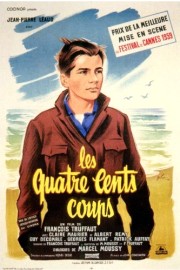The 400 Blows
While writing reviews, I sometimes try to pick music that will put me in the same frame of mind the film I am writing about did. Usually this will be a score within the same genre of film I am writing about. (My “Magnificent Seven” review, for instance, was scored by Ennio Morricone and his iconic Western work.) When I opened iTunes to find the soundtrack appropriate for my review of Francois Truffaut’s “The 400 Blows,” I opted for Bruce Springsteen, my favorite artist of all-time, and it makes sense. Like The Boss’s best songs, there’s something poignant and wild and filled with memories of youth in Truffaut’s debut film, and it would not surprise me if I heard that the film was one of Springsteen’s favorites. This is a story about being trapped by circumstances, and finding a way to break free in the end. That’s the story of (at least) every 3rd or 4th Springsteen song, it seems. That’s not a knock on The Boss- in fact, it’s what I love about his music, and it’s what resonates with me about Truffaut’s film.
One of my big regrets in the 15 years I’ve been a Netflix member has been my inability to really go deep into the French New Wave that hit cinemas in the late ’50s/early ’60s- I usually have too many recent movies to catch up with. The French New Wave was made up of a collection of critics from the magazine, Cahiers du Cinema, who cut their teeth under Andre Bazin, whom Truffaut dedicated his film to, and used their knowledge of cinema from a critical perspective to push movies into a new direction. Their guiding purpose was the notion of the “auteur theory,” which states that the director, and no one else, is the author of a film. The only two filmmakers I’ve taken in from the New Wave are, naturally, the most famous- Truffaut and Jean Luc Goddard. I still have a way to go with both, though, and that’s been the frustrating part. Expect to see them, and their fellow New Wavers, as a regular part of my “Movie a Week” series from here on out.
Truffaut is a filmmaker for whom cinema was a truly spiritual experience, someplace where he could lose himself, and subsequently find himself, within the frames that moved 24 frames per second. That comes through in “The 400 Blows,” wherein we follow Antoine Doinel (Jean-Pierre Leaud), a young boy who can’t keep himself out of trouble. Truffaut is careful not to frame Doinel as a bully or thug, but as a kid who seems to need a place to focus his energies in order to find his way. His mother (Claire Maurier) is tough on him, while his step-father (Albert Remy) is a bit easier, but both are almost at the end of their rope with Antoine’s insolence, at least as they understand it coming from his teachers. We first see him in class, and a pinup calendar is being passed around the class; it’s only when it’s in Antoine’s hands that the teacher (Guy Decombie) notices it, so naturally, Antoine is the one who is punished. He and a friend steal a typewriter, but it’s when he comes to return it when he gets into his worst trouble. He isolates himself by spending a weekend away from his parents house, not because they’re necessarily angry at him, but because he doesn’t want to be a burden on them. When he skips class because his homework isn’t done, his excuse of his mother dying was ill-advised, but is really the worst thing he does. He feels adrift in life, and needing something to focus him. The movies help, and that is as sure a sign as any of “The 400 Blows” being an intensely personal film for Truffaut, but still, Doinel cannot escape what feels like his destiny of being sent to a youth detention center. The question is whether that will hold him, and the final few minutes suggest he will not be there for long.
Springsteen’s music actually makes for a good comparison point for “The 400 Blows,” and the funny thing is that I didn’t think about it when the film was going. Truffaut wears his heart on his sleeve in this film, and has nothing but love for his protagonist. (He would later make three more features, and a short, about the character, all of which will be reviewed here.) He helps us understand the truth about Antoine even if everyone else is just getting part of the story. The moments we see him in his bedroom reading, or setting up a shrine to his hero, Balzac, are details no one else can see, but help us see the heart of who Antoine is as a person. He may come off as an irresponsible kid to others (not undeservingly), but we see there is more to him, and that is what we come away with when Truffaut’s final shot comes up. The score by Jean Constantin, while we are talking music, is another part of how Truffaut tells the entirety of Antoine’s story, and gets us on his side. The score is wistful, poignant and frustrating, like the film’s protagonist, and it tells the story completely. I anxiously await where Truffaut took his main character next.










